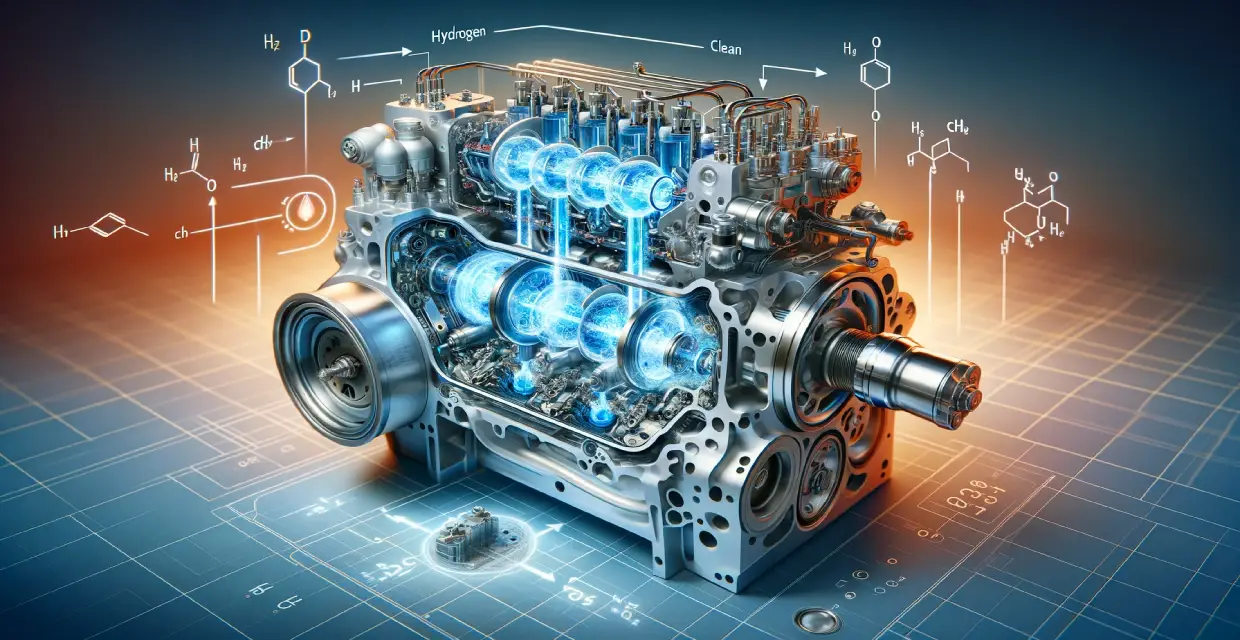

Traditional internal combustion engines, such as diesel engines or petrol engines technology are known for their high fuel consumption and environmental effects. The fuel economy is focusing on hydrogen and oxygen-powered combustion engines, which utilise the combustion process to drive the vehicle. Hydrogen fuel cell vehicles are also being developed simultaneously and are said to be associated with a hydrogen fuel-powered future. Let us understand how Hydrogen Internal Combustion engines burn hydrogen to generate energy and how it is different from fuel cell vehicles.
A device known as a fuel cell converts hydrogen into electricity through an electrochemical reaction. They work by using electrochemical processes and have an anode, a cathode, and an electrolyte. Hydrogen moves into the anode and splits into protons and electrons. Electrons make an electric current, and protons move through the medium. At the cathode, oxygen protons and electrons come back together to make water. Fuel cell vehicles like hydrogen cars and electric cars utilise a fuel cell stack to generate power from hydrogen. This allows them to run on hydrogen gas from on-board hydrogen storage tanks. Fuel cells offer benefits like zero emissions and high efficiency. The process produces clean energy without emissions. In hydrogen vehicles, hydrogen fuel cell engines offer high efficiency, quick refuelling, and longer ranges compared to traditional batteries. Their promise lies in sustainable transportation, paving the way for a greener future.
Also Read:- Different Types of Car Engines
Existing internal combustion engines can also be adapted to use hydrogen as a fuel instead of gasoline. Combustion of hydrogen can be produced through the standard four-stroke engine cycle. Hydrogen-fueled internal combustion engines inject pressurised hydrogen from storage tanks. With precise fuel delivery systems for hydrogen and tailored combustion parameters, hydrogen engines can match traditional combustion engine performance.
Also Read:- What are Hydrogen Cars?
Major automakers have introduced prototype hydrogen vehicles, including hydrogen cars, SUVs, trucks and buses. These hydrogen cars are powered by either a mixture of hydrogen fuel cells and hydrogen combustion engines or independent technologies. These showcase the potential for transportation powered by hydrogen. Challenges remain around hydrogen production, storage density, delivery systems for hydrogen vehicles, and infrastructure like hydrogen refuelling stations. Using engines powered by hydrogen to run a vehicle is way more efficient than natural gas engines without emissions of any sort.
Ongoing research aims to continue the development of hydrogen technology for transportation applications. Improving the efficiency of hydrogen fuel cells, reducing the cost of high-pressure hydrogen tanks, and optimising engine parameters like combustion timing and turbulence can further viability. More affordable green hydrogen production and expanded hydrogen infrastructure will also enable wider adoption. The development of hydrogen internal combustion engines has been pacing rapidly due to the existing engine and combustion technology. The usage of liquid hydrogen allows a significant decrease in the cost of hydrogen storage and, in the end, the overall cost of hydrogen to power engines.
Also Read:- Hydrogen vs. Electric Cars
Hydrogen engines bring a lot of advantages to the table and for good reasons. They are the future of automotive and it is important to understand their advantages and disadvantages.
Versatile Hydrogen Engines: Hydrogen engines are efficient and provide better and eco-friendly alternatives to traditional gasoline engines.
Hydrogen Production: The production of hydrogen involves diverse methods which are flexible and sustainable.
Storage and Transportation: Advances in hydrogen storage and transportation technologies address challenges related to density, making hydrogen a viable fuel option.
Adaptability of Hydrogen Engines: Apart from Vehicles, hydrogen engines can even be adapted in other industries.
Combustion Temperature Control: Hydrogen's combustion temperature proves to be an advantage, ensuring optimal performance.
Fuel and Air Combustion: The combustion process involves combining hydrogen fuel with air, contributing to cleaner emissions compared to conventional engines.
Integration with Electric Engines: Hydrogen engines can complement electric engines, providing diverse options for sustainable transportation.
Utilisation of Natural Gas Systems: Hydrogen engines can leverage existing natural gas fuel delivery systems, easing the transition to alternative fuels.
Hydrogen Refuelling Infrastructure: The growing number of hydrogen refuelling stations supports the expansion of hydrogen-powered vehicles, addressing infrastructure challenges.
Also Read:- Upcoming Cars in 2024
Just like a coin, this technology also has two sides. We can’t call this foolproof but knowing our weaknesses helps us overcome them quickly.
Storage Challenges: Storing hydrogen efficiently involves addressing issues related to density, requiring specialised storage solutions.
Adaptation Complexities: While engines can be adapted, the transition to hydrogen-powered vehicles requires overcoming technical complexities and design challenges.
Emission Concerns: Hydrogen combustion engines, while cleaner, still produce emissions, necessitating ongoing efforts to minimise environmental impact.
Limited Hydrogen Stations: The current limited number of hydrogen refuelling stations poses challenges for the widespread adoption of hydrogen vehicles.
Efficiency Variability: Hydrogen engines may have varying efficiency levels, influencing their competitiveness compared to other propulsion technologies.
Hydrogen Combustion with Air: The combustion process with a given amount of air must be carefully managed to optimise efficiency and reduce emissions.
Examples of Hydrogen Engines: Despite advancements, examples of hydrogen engines in mainstream applications are still limited, hindering broad acceptance.
Ensuring Hydrogen Supply: Ensuring a consistent supply of hydrogen is crucial for the sustained operation of hydrogen-powered vehicles and engines.
Also Read:- 5 Seater CNG Cars
It's important to know how hydrogen fuel cells and hydrogen engines are different. Using hydrogen instead of fossil fuels to power cars could be a good way to make transportation more environmentally friendly. As fuel cell systems and internal combustion cycle optimisation get better, hydrogen vehicles will become more important to a greener future for cars. For more details about cars and upcoming car technologies, visit Park+.